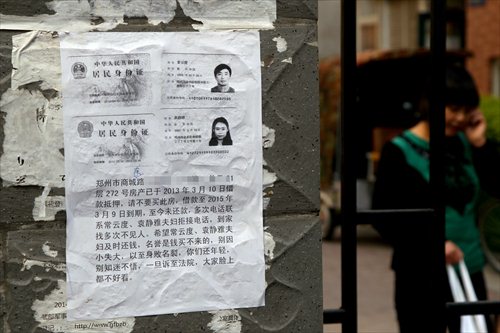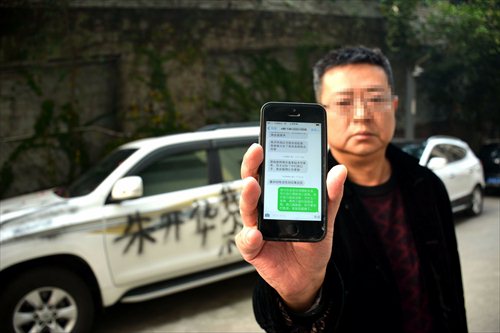HOME >> METRO SHANGHAI
How China’s debt collectors go to work
Source:Global Times Published: 2016/6/20 18:08:01

Police seized knives from a debt collector's car. Photo: IC
The Southern Metropolis Daily reported recently that some Chinese loan sharks were demanding nude photos from college students as guarantees for loans. Students had to send copies of their ID cards and contact information for their families together with the nude photos.
If a borrower failed to pay back the loan in time, the lenders could publish the nude photos or contact the borrowers' families. More and more students are falling prey to this tactic.
Today most personal loans are transacted privately through online platforms. If borrowers fail to pay back in time, lenders hire professional debt collectors to extract payment - and modern debt collectors have a range of techniques to force borrowers to repay.

Debt collectors put these copies of loan defaulters' ID cards on the gate of a residential compound. Photo: CFP
Lending platforms
Debt collectors register on lending platforms and find business through these platforms. They also look for business through WeChat, QQ, online forums or directly through lenders.
One of the simplest and most direct methods just involves sending text messages and calling the borrowers. Mr Yang works for a debt collecting company in Guangzhou and explained that the most common debt collection methods involved phoning or visiting the borrowers and taking them to court.
Debt collectors prefer telephone calls, because these are simple and direct. One man who missed repayments on his credit card found himself harassed by a woman debt collector. She called him at least once a day urging him to pay the debt. "She abused me, mocked me and even called my office and asked colleagues to help me pay the debt," he said.
This is just the first stage. Some debt collectors then start calling every minute hoping the constant harassment will force the borrower to repay quickly.
One Shanghai woman, Ms Gu, owed money and discovered that the debt collectors chasing her for repayment used computer software to call her every minute. "They kept doing this for a week. I dared not switch on my phone over that period," Gu said. "They even called my family, and asked them to push me to pay."
If constant phone harassment doesn't force the repayment, some debt collectors then publish the borrower's personal information online. A person's cellphone number, ID number, home address and online account information could all be put on public view.
Some lending platforms now ask student borrowers to fill in contact details for their classmates and relatives. If a student can't repay on time, the platform will tell the friends and family about the loan. "If he can't pay, his parents can," the general manager of an online lending company said. These companies can find the contact information for parents legally or otherwise.
The risk control manager of one online lending platform told the Southern Metropolis Daily that debt collectors have a 10-step method for student borrowers and this involves (in order) contacting the student online, sending text messages, making phone calls, contacting roommates, contacting parents, formally warning the borrower, sending legal demands, personal visits, putting posters around the borrower's school and then sending messages to all the friends and relatives.
"Usually they pay up when we get to the fourth step which is where we contact the roommates," the manager said.
Personal details
Debt collectors also have accounts on Weibo, the Chinese Twitter-like social website and they use these accounts to publish the personal information of borrowers who owe them money. One list of individuals who had failed to repay debts was published on Weibo recently. The list included names, sex, cellphone numbers and amounts owed.
One woman surnamed Ye appeared on the list as a regular delinquent debtor owing 10,000 yuan ($1,532). When the Southern Metropolis Daily phoned her, Ye wasn't aware her personal information had been published online. She said she had repaid the debt last month.
Ye had borrowed 10,000 yuan from an online lending platform and when the repayments became overdue, she began receiving harassing phone calls. Although she promised to repay the debt and pay a fine for being late she was being bombarded with more than 12 calls a day. Then a caller threatened to hurt her if she didn't repay quickly.
Ye also provided contact details for her family when she applied for the loan. Her father also began receiving threatening phone calls. The calls all appeared to be coming from Qingdao, where Ye lived and the callers began threatening to go to her home and her office, saying they were close by.
Even after she had repaid the debt and cancelled her account on that platform, Ye found herself still being harassed by collectors.

Debt collectors send this man a message threatening to hurt the father of his loan defaulter friend. Photo: CFP
Commission charged
One debt collector surnamed Zhao explained the system. For each debt that they collect successfully, collectors charge between 30 and 50 percent as commission.
"If the debt is more than 10 million yuan, it's a lot harder to collect and takes more time and energy," Zhao said. "We have to negotiate our commission with the lenders before proceeding, including how much we would be paid for searching information."
After this is agreed, the debt collector will phone the borrower two or three times. "This is just a courtesy to the borrower," Zhao said. If calling them doesn't work, the debt collectors then find the borrower's home address. "We have links with people who help us find the borrowers," Zhao said.
The collectors then watch for a few days, getting details like work schedules, family members, apartments and cars which can help the collectors assess the ability of the borrower to repay the debt.
"They can pay with their homes or cars if they don't have enough cash," Zhao said.
He said borrowers who owe 100,000 yuan or less are never physically harmed. But some debt collectors have been known to strip nonpayers and throw them into a river or lake - this leaves no marks. "As long as we get him or her back within 24 hours, we will not be legally liable," Zhao said.
Zhang Xinnian, a lawyer from Beijing, believes that disclosing borrowers' personal information is an invasion of privacy. A person's cellphone number is private and this can be connected to important accounts. Publishing personal information including phone numbers is an invasion of privacy, Zhang said. He said that debt collectors have no rights to publish borrowers' information online.

Police display other weapons seized from debt collectors. Photo: CFP
Legal methods
"There are many legal ways to collect a debt - this can be done by negotiation, mediation, and litigation," Zhang said.
Zhang thinks that if lenders demand nude photos from borrowers they are breaching public order regulations and breaking social conventions and this would render those loan contracts invalid.
"And even if the contracts are valid, the lenders have no legal relationships with the parents and friends of the borrowers," Zhang said. Harassing families and friends was wrong. Debt collectors were invading their privacy too if they disclosed personal information of the families and friends.
Zhang believes that financial, public security, and cyber security authorities have a responsibility to enforce the law in private financial transactions. They should be working with each other to fight this sort of crime.
Compiled by Yang Lan based on an article from the Southern Metropolis Daily
Newspaper headline: Loans and the naked truth
Posted in: Metro Shanghai, City Panorama